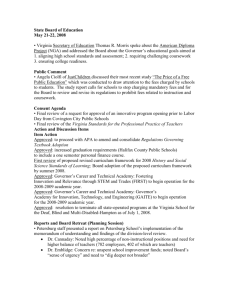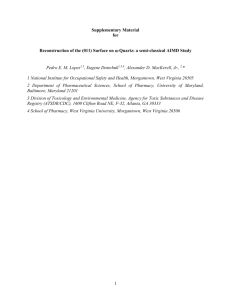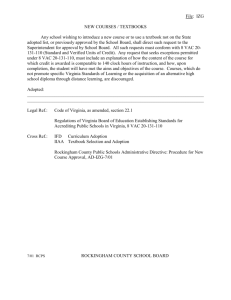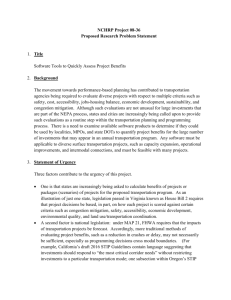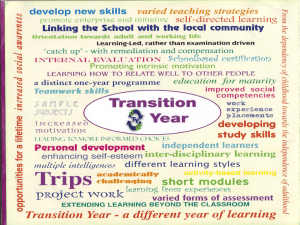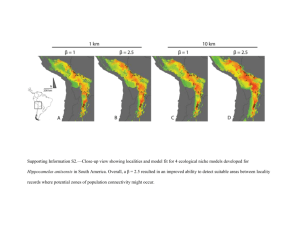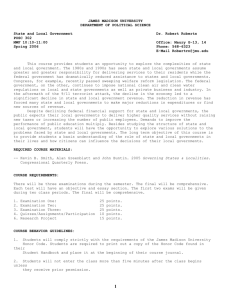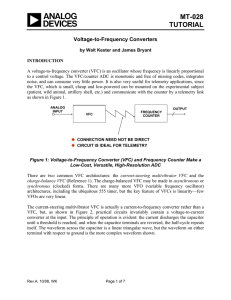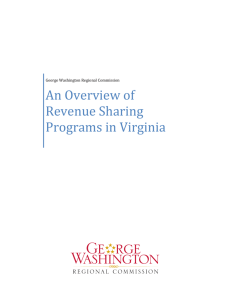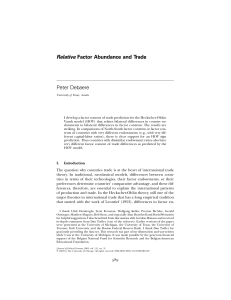VFC strongly supports preserving funds for state programs that have
advertisement
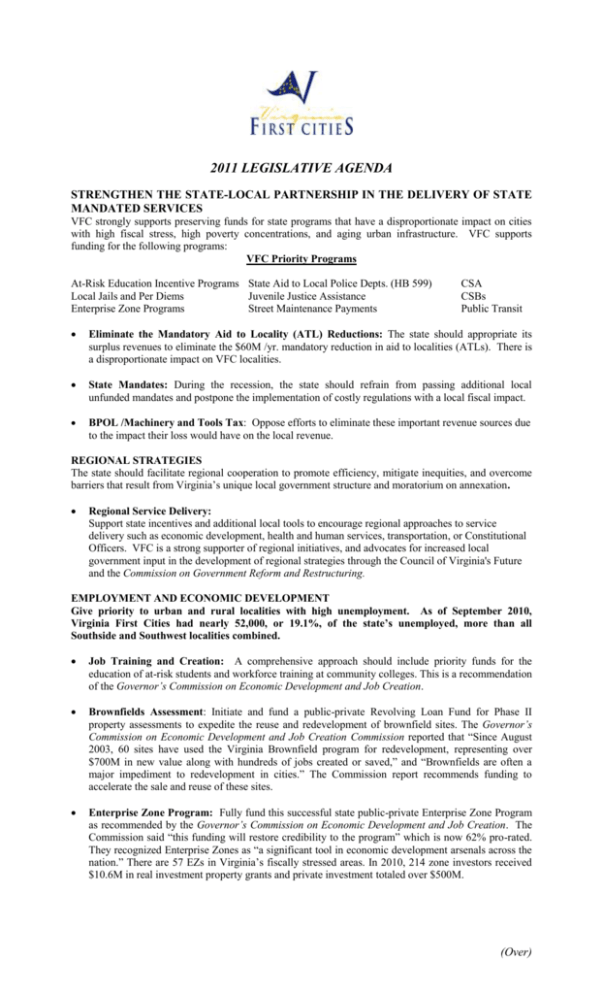
2011 LEGISLATIVE AGENDA STRENGTHEN THE STATE-LOCAL PARTNERSHIP IN THE DELIVERY OF STATE MANDATED SERVICES VFC strongly supports preserving funds for state programs that have a disproportionate impact on cities with high fiscal stress, high poverty concentrations, and aging urban infrastructure. VFC supports funding for the following programs: VFC Priority Programs At-Risk Education Incentive Programs State Aid to Local Police Depts. (HB 599) Local Jails and Per Diems Juvenile Justice Assistance Enterprise Zone Programs Street Maintenance Payments CSA CSBs Public Transit Eliminate the Mandatory Aid to Locality (ATL) Reductions: The state should appropriate its surplus revenues to eliminate the $60M /yr. mandatory reduction in aid to localities (ATLs). There is a disproportionate impact on VFC localities. State Mandates: During the recession, the state should refrain from passing additional local unfunded mandates and postpone the implementation of costly regulations with a local fiscal impact. BPOL /Machinery and Tools Tax: Oppose efforts to eliminate these important revenue sources due to the impact their loss would have on the local revenue. REGIONAL STRATEGIES The state should facilitate regional cooperation to promote efficiency, mitigate inequities, and overcome barriers that result from Virginia’s unique local government structure and moratorium on annexation. Regional Service Delivery: Support state incentives and additional local tools to encourage regional approaches to service delivery such as economic development, health and human services, transportation, or Constitutional Officers. VFC is a strong supporter of regional initiatives, and advocates for increased local government input in the development of regional strategies through the Council of Virginia's Future and the Commission on Government Reform and Restructuring. EMPLOYMENT AND ECONOMIC DEVELOPMENT Give priority to urban and rural localities with high unemployment. As of September 2010, Virginia First Cities had nearly 52,000, or 19.1%, of the state’s unemployed, more than all Southside and Southwest localities combined. Job Training and Creation: A comprehensive approach should include priority funds for the education of at-risk students and workforce training at community colleges. This is a recommendation of the Governor’s Commission on Economic Development and Job Creation. Brownfields Assessment: Initiate and fund a public-private Revolving Loan Fund for Phase II property assessments to expedite the reuse and redevelopment of brownfield sites. The Governor’s Commission on Economic Development and Job Creation Commission reported that “Since August 2003, 60 sites have used the Virginia Brownfield program for redevelopment, representing over $700M in new value along with hundreds of jobs created or saved,” and “Brownfields are often a major impediment to redevelopment in cities.” The Commission report recommends funding to accelerate the sale and reuse of these sites. Enterprise Zone Program: Fully fund this successful state public-private Enterprise Zone Program as recommended by the Governor’s Commission on Economic Development and Job Creation. The Commission said “this funding will restore credibility to the program” which is now 62% pro-rated. They recognized Enterprise Zones as “a significant tool in economic development arsenals across the nation.” There are 57 EZs in Virginia’s fiscally stressed areas. In 2010, 214 zone investors received $10.6M in real investment property grants and private investment totaled over $500M. (Over) EDUCATION/PREVENTION Reduce the achievement gap and improve Virginia’s workforce and long-term economy by directing additional funds to public schools with high at-risk populations to increase graduation rates and educational attainment. Local Composite Index (LCI): Increase the FY12 hold harmless for the LCI beyond the 50% adopted in 2010. Support Funds for At–Risk Add-On, K-3 Class Size Reduction, and Virginia Preschool Initiative and other education incentive fund programs. These programs are responsible for improving SOL and NCLB test scores and standards of achievement and reducing student dropout rates. Maintain access to prevention initiatives that work including the “Smart Beginnings” initiative and the successful “Healthy Families” program. URBAN REVITALIZATION Neighborhood Preservation: Support policies that maintain vibrant neighborhoods and eliminate blight. The Governor’s Economic Development and Job Commission recommends providing state financial and tax incentives to: 1) enhance the economic feasibility of reusing vacant, abandoned, and derelict structures and 2) encourage private investment to rehabilitate buildings in older neighborhoods and commercial districts. Evictions: Support legislation that eliminates the provisions permitting the personal property of persons being evicted from being placed in the "public way." Instead, personal property of persons being evicted should be placed in a secure location to be provided by the owner of the real estate. Housing Trust Fund: Support the establishment of a Housing Trust Fund to increase affordable housing across urban areas. TRANSPORTATION/LAND USE/INFRASTRUCTURE Oppose shifting additional general funds to transportation. Enact state transportation revenue increases to adequately support the transportation network. Maintain street maintenance funding and policies. This helps maintain critical city and town infrastructure. Restore state funds for public transportation and provide strong incentives for participation by all localities in the provision of regional public transportation service. Provide state dedicated funds for the operation of inter-city passenger rail service. Support state transportation land use policy initiatives that use existing infrastructure, support city redevelopment, and discourage dispersed development patterns. Urban Infrastructure: Support funding to maintain critical water and sewer infrastructure. OTHER POSITIONS Support state prisoner re-entry programs to reduce recidivism and create safer communities. Eminent Domain: Oppose an eminent domain constitutional amendment. Eminent domain laws were strengthened in 2007 that limit condemnation by housing authorities and localities. A constitutional amendment is unnecessary. Gubernatorial Succession: Support legislation allowing Virginia governor to serve a maximum of two successive terms. Predatory Lending: Support the enactment of laws strictly prohibiting and deterring all predatory, usurious lending practices, including provisions that: o Provide an interest rate cap of thirty-six percent (36%), calculated as an effective annual percentage rate including all fees or charges of any kind, for any consumer credit extended in the Commonwealth of Virginia; o Prohibit a creditor’s use of a personal check or other device as a means, directly or indirectly, to gain access to a consumer’s bank account; and o Incorporate into the Virginia Code the protections regarding consumer credit to military personnel as reflected in the Military Lending Act, 10 United States Code Section 987. Illegal Gambling: Support legislation that clarifies whether Internet Cafe “sweepstakes” games are legal. This practice has been outlawed in N.C. as illegal gambling. 2
